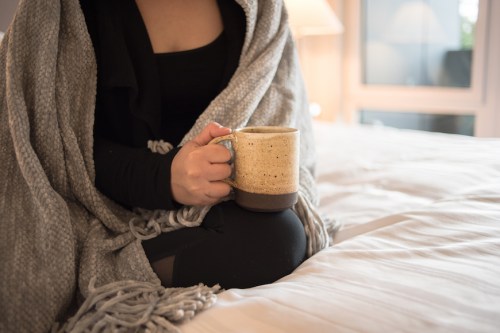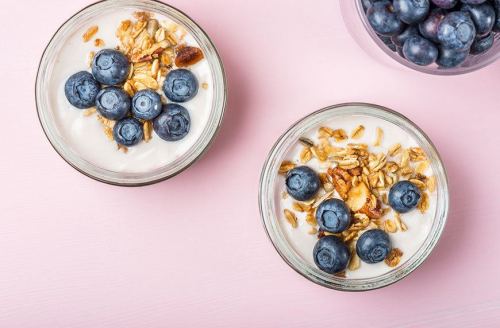Our editors independently select these products. Making a purchase through our links may earn Well+Good a commission
According to a 2019 Well+Good survey of 1,500 readers, 83 percent reported that a lack of sleep takes away from their quality of life. Clearly our bedtime routines need a little revamping and anything that can help in the sleep department will be a welcome addition.
Tea for sleep has long been a remedy people all over the world have turned to. One reason may be the ritual of it; brewing a hot cup of tea and sipping it before bed can help tell your brain that it’s the end of the day (and thus it’s time to slow down for sleep). But many herbs themselves play a part, too.
While some teas are linked to better sleep, registered nutritionist Karen Collins, RD, emphasizes that it’s only one piece to the puzzle for sleeping well. “A key point for someone who is having trouble with sleep is to think about what situations or choices may be involved,” she says. “For example, some people’s trouble with sleep might related to caffeine, alcohol, blue light exposure, jet lag, or habits that have conditioned them to not be ready to sleep.” It’s important to get to the root cause of what’s keeping you up at night, which may take the help of a therapist to pinpoint and treat.
Consider tea for sleep a sidekick to the main actions you’re taking to get to the bottom of your sleep problems. Having an evening routine can help transition from a stressful day to peaceful time in bed, and if you’re going to incorporate a tea into your night, make it one of these. Listed here are the most common teas for sleep, with Collins’ insight and what scientific research says about them.
5 teas for sleep
1. Valerian tea
Despite being one of the most common herbs studied for sleep, Collins says scientific studies are actually mixed on if it truly works or not. “According to ConsumerLab and the Memorial Sloan Kettering Integrative Medicine Center, valerian may decrease time to get to sleep and reduce anxiety, but it is likely to be no better than placebo,” she says. Experts believe that the herb potentially prevents the breakdown of a specific neurotransmitter, which has a calming effect on the body. (But more research is needed to see exactly how well it works for sleep and why.)
If you’ve never tried valerian tea before, you should know that it has a strong, earthy taste so you may want to sweeten it up with a little cinnamon. In terms of any side effects or warnings, Collins advises not taking it after consuming alcohol or sedatives (because of its connection to relaxing the body), avoiding if you are pregnant or breastfeeding, or if you have pancreatic or liver cancer (some cases of toxicity have been reported). Otherwise, you’re in the clear to try it!
Try it:Pukka Herbs Night Time Tea with Valerian Root ($14.47 for three boxes)
2. Chamomile tea
Chamomile tea is perhaps the most popular tea for sleep used in the U.S. Similar to valerian tea, Collins says that despite being used for centuries for sleep or anxiety, once again the actual scientific evidence are mixed. “If it works, it’s thought that a flavonoid compound called apigenin might raise levels of GABA, a neurotransmitter that ‘puts the brakes on’ to lower stress, and bind to GABA receptors, decreasing feelings of anxiety,” Collins says. But this is only a theory, she says.
Though the scientific evidence is mixed, chamomile is widely thought of as safe, so it’s a great tea for sleep to experiment with if you’re looking for a tea for sleep. However, Collins says if you’re allergic to ragweed, chrysanthemums, marigolds, or daisies, you may also have an allergic reaction to chamomile. And like any herbal tea or product, talk to your doctor first if you’re currently taking any medications.
Try it: Celestial Seasons Chamomile Herbal Tea ($13.44 for six boxes)
3. Lavender tea
Next to chamomile, lavender is another very popular tea for sleep—even just the smell of it has been scientifically linked to calming the body. But take some of the claims around it with a grain of salt, says Collins.
“Lavender is sometimes used as a tea and sometimes as aromatherapy. It’s important when you see claims about lavender and sleep or relaxation that you check how lavender was used, since we can’t assume that effects of aromatherapy apply to oral consumption in a tea, and vice versa,” Collins says.
For example, a meta-analysis published in the journal Evidence Based Complement Alternative Medicine states that using lavender oil as aromatherapy enhances dopamine receptors in the brain, at least in mice. This can raise levels of GABA, similar to how chamomile works. This in turn can lower the amount of anxiety someone may be feeling. However, Collins says that other studies have found that other measures taken with lavender aromatherapy, like massage, were just as effective for anxiety without it. Plus, “a handful of clinical studies have shown some benefits of oral lavender against anxiety, but overall there’s very little scientific evidence on effectiveness for sleep,” she adds. That’s not to say that drinking lavender tea has zero merit—just don’t expect it to do miracles if you’re not the greatest sleeper.
Like chamomile, lavender tea is widely considered safe, so it’s a pretty uncontroversial one to try incorporating into your evening. The caveat to this, Collins says, is if you have a hormone-sensitive cancer. And of course if you are on any medications, talk to your doctor first.
Try it: The Republic of Tea Get Relaxed Lavender Tea ($12)
4. passionflower tea (also called Maypop)
Like lavender tea, the primary reason passionflower tea has been linked to better sleep is because of its connection to lowering anxiety, a major cause of sleepless nights for many people. “A handful of studies suggest that passionflower may reduce anxiety, and limited evidence suggests that it could make it easier to fall asleep,” Collins says. One study, for example, found that passionflower (taken as a capsule) was more effective than a placebo in being used for general anxiety disorder. Another study found that passionflower significantly increased the amount of sleep time, at least in rats.
A few PSAs when it comes to trying passionflower tea: Collins says that it may induce contractions, so it’s best to avoid this one if you’re pregnant. Also, if you’re breastfeeding or if you’re taking any medications, talk to your doctor first.
Try it: Tardin Tea Passionflower Tea ($6.02)
5. lemon balm tea
There’s promising scientific research suggesting that lemon balm can be used for relaxation and sleep. “Lemon balm extracts have been found to produce a sedative effect in mice and handful of human trials have found calming and anti-anxiety effects,” Collins says. “Some studies suggest that lemon balm combined with valerian might help reduce insomnia.” It especially seems to be effective in helping people with mild-to-moderate anxiety or insomnia. However Collins points out that this is another tea that more research needs to be done since most of the studies use lemon balm capsules, not tea.
Like the other teas on this list, lemon balm is widely considered safe, although it’s always a good idea to talk to your doctor first, if you are on any medications or have any underlying medical issues.
Try it: Traditional Medicinals Organic Lemon Balm Tea ($4.99)
While the scientific evidence is still mixed on just how well these teas for sleep work, there’s no harm for most people in adding one to their evening routine. If a cup of tea helps you feel more relaxed in the evening, it could play a helpful role in your sleep routine. Just make sure it’s caffeine-free!
Sign Up for Our Daily Newsletter
Get all the latest in wellness, trends, food, fitness, beauty, and more delivered right to your inbox.
Got it, you've been added to our email list.











